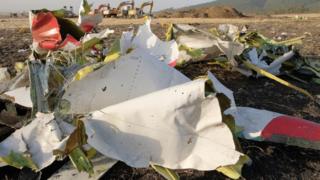Boeing has launched fixes for its 737 Max plane
 Image copyright Getty Images
Image copyright Getty Images Boeing has issued changes to controversial control systems linked to two fatal crashes of its 737 Max planes in the last six months.
But it’s still not certain when the planes, that were grounded worldwide this month, will be allowed to fly.
Investigators have not yet determined the cause of the accidents.
As part of the upgrade, Boeing will install as a standard a warning system, which was previously an optional safety feature.
Neither of the planes, operated by Lion Air in Indonesia and Ethiopian Airlines, that were involved in the fatal crashes, carried the alert systems, designed to warn pilots when sensors produce contradictory readings.
Boeing said in future airlines would no longer be charged extra for that safety system to be installed.
Upgrade
The planemaker has also issued an upgrade to the software that has been linked to the crashes.
The Manoeuvring Characteristics Augmentation System (MCAS), designed to keep the plane from stalling, reacts to sensors which detect whether the jet is climbing at too steep an angle.
But an investigation of the Lion Air flight last year suggested the system malfunctioned, and forced the plane’s nose down more than 20 times before it crashed into the sea killing all 189 passengers and crew.
The US Federal Aviation Administration says there are similarities between that crash and the Ethiopian accident on 10 March.
Boeing has redesigned the software so that it will disable MCAS if it receives conflicting data from its sensors.
Timetable
Boeing said a final version of the software would be submitted to the Federal Aviation Authority (FAA) by the end of the week.
But it added that airlines would have to install the new software, give feedback on its performance, and train pilots before the changes could be certified and the planes passed safe to fly again.
In a briefing to reporters Boeing said that the upgrade to MCAS was not an admission that the system had caused the crashes.
A joint investigation by the U.S. National Transportation Safety Board, France’s aviation investigative authority BEA and Ethiopia’s Transport Ministry is expected to release a preliminary report into the Ethiopian crash this week.
A Boeing official said: “Following the first incident in Indonesia we followed the results of the independent authorities looking at the data, and, as we are always looking to ways to improve, where we find ways to improve, we make those changes to make those improvements.”
FAA is also coming under scrutiny on Wednesday as the Senate Commerce sub-committee on Aviation and Space is due to question its acting head Daniel Elwell as to why the FAA was one of the last of the world’s regulatory bodies to ground the plane after the two crashes.



